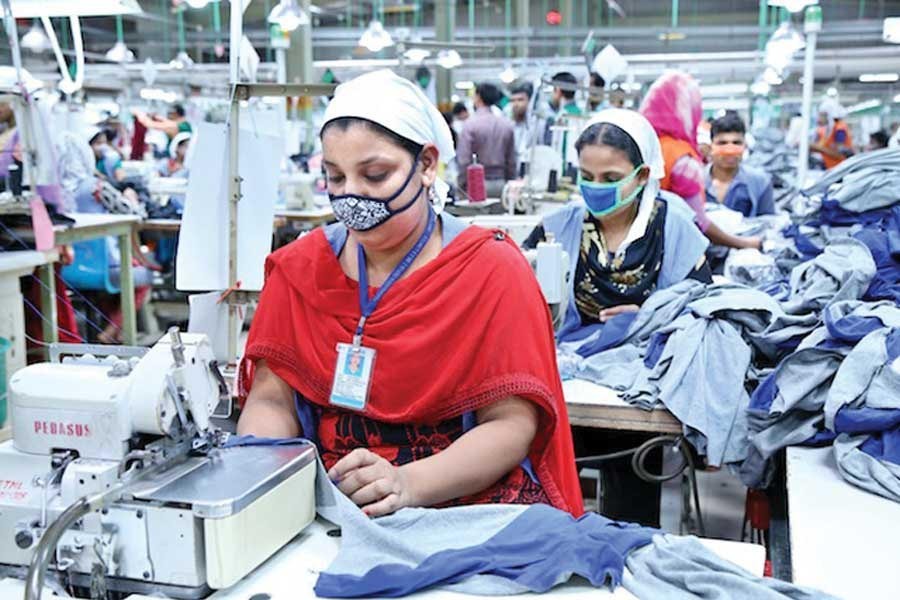Bangladesh economy 'narrow', dominated by RMG, remittances: ADB

Published :
Updated :

The Asian Development Bank (ADB) has said Bangladesh's growth-induced poverty reduction would not be sustained unless it ramps up investment and diversify the economy.
But the financial sector's inefficiencies and other constraints hamper the investments needed to maintain the growth momentum, the bank's Independent Evaluation Division (IED) said.
" … sustaining higher levels of poverty-reducing growth will require increasing levels of investment and greater economic diversification," the ADB's IED said in a recent assessment of Bangladesh.
Besides, doing business often faces additional regulatory barriers, it said, adding the lack of regulatory predictability deters investment.
Nevertheless, aggregate private investment remains restrained at 23 per cent of Gross Domestic Product (GDP), with foreign direct investment at less than 1.0 per cent of GDP, which is low compared with that in countries at similar levels of development, the report said.
The IED, an independent body for evaluating ADB's operations in its member countries, is working with the government agencies for preparing the Bangladesh country assistance program evaluation (CAPE).
The evaluation is expected to be finalised by early next month, the ADB and the ministry of finance officials said on Saturday.
After completing evaluation, the IED is expected to provide the board of directors and management of the Manila-based lender with an independent assessment of the ADB's strategy for Bangladesh and the operational performance of its investment portfolio and technical assistance.
The IED, in its preliminary assessment, said the Bangladesh economy is "narrow," dominated by remittances and garments manufacturing.
It is the second-largest ready-made garments exporting country in the world, next to China.
"While the expansion of the export base appears promising for products other than garments-leather goods, processed foods, pharmaceuticals, light engineering, shipbuilding, and services-there are significant constraints to higher investment in these sectors and more generally across the economy," its assessment said.
The report said the rise in production costs in China and other emerging economies could stimulate relocation.
However, the lack of land, infrastructure, skilled human resources, complicated tax regime, and the process of starting business and repatriation of profit could be the hurdles for tapping the relocation opportunities.
"Bangladesh could be an attractive destination. It is essential for land, infrastructure, and skilled human resource to be available. It would also be necessary to simplify the tax structure, the process of starting a business, and repatriating profits," the report said.
Besides, the country is needed to effectively mobilise long-term capital for investment, banking sector reform and well-functioning capital market, it said.
Bangladesh's banking sector has experienced a rise in non-performing loans.
The share of bad debt to total lending has been above 9.0 per cent for the last three years and private sector credit growth has continued to fall.
"Entrepreneurs in Bangladesh continue to raise concerns about difficulties and delays when dealing with regulatory bodies particularly in terms of what is perceived as a discretionary application of rules and regulations, according to the report.
The report said narrowing the infrastructure gap requires not only more investment, but also improving the maintenance of existing assets.
The lack of reliable electricity supply and the shortage of natural gas are major binding constraints to economic growth, it said.
The report said the infrastructure challenge in key sectors such as transport, water and energy calls for a comprehensive infrastructure financing strategy based on a combination of tax funding, partnership with the private sector, and cost recovery.
Structural issues around bankability, coupled with near-term challenges, may hold back private sector participation in infrastructure development, it added.
The Manila-based lender said at 9.6 per cent of GDP in 2018, tax revenue in Bangladesh is among the lowest in Asia and insufficient to finance the level of public spending needed to support development.
Failure to boost revenue could constrain expenditure pledged for implementing priority projects and improving essential services and infrastructure maintenance, it warned.
kabirhumayan10@gmail.com


 For all latest news, follow The Financial Express Google News channel.
For all latest news, follow The Financial Express Google News channel.